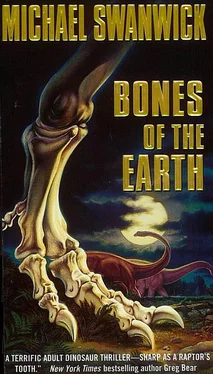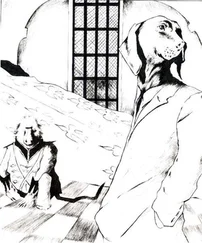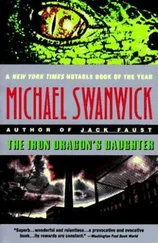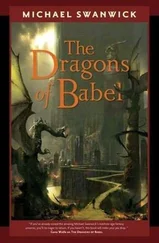While it was thus occupied, the stygivenator emerged from the wood, moving at top speed. Its jaws closed upon the troodon before the smaller predator knew what was happening. One crunch, and the bugger was dead.
It was an incredibly violent era, sustained only by the enormous number of offspring almost everything here produced. Which was what made it so astonishing that so many did reach adulthood. The network of interspecific cooperation—the tyrannosaur as farmer—resulted in a staggering efficiency, which allowed a greater population of the largest life forms than would otherwise be possible.
He couldn’t help thinking again of Salley’s talk, so long ago and so far in the future, when she had said that ceratopsians were farmed by their predators. He smiled. It was so typical of her to impress him with his own work. In some ways she was not a very good scientist: impatient with data, too ready to leap to conclusions, apt to judge an idea not by its merits but by its sheer niftiness.
But paleontology needed her, as leavening if nothing else. Science needed leapers as well as plodders, visionaries as well as detectives.
She was a kite. She needed only the most tenuous connection with the ground in order to fly, a sure string of logic with a reliable hand at the end of it to make sure she didn’t take a nosedive straight into the ground. More than anything he wished he could be the hand at the end of her kite string.
Watching the banks flow by, he slid off into a reverie. He didn’t notice when Jamal took the lead away from him, and moved to the bow to take readings. He didn’t notice how careful the others were to avoid disturbing him.
* * *
The cycle began with the spring migrations, when flights of tyrannosaurs, living off their winter fat, spread across the land looking for territory to establish. These were the breeding males. The females followed at a more leisurely pace, sparing themselves the initial hardship, and arriving well-fed and ready to breed.
The Lord of the Valley (they could identify him by his scars) returned to claim the previous year’s territory and, because he was experienced and in his prime, faced only a few challenges from younger males. He paced off the perimeter of his valley, singing, both to warn away competitors and to call in the titanosaurs.
The titanosaurs, those vast eating machines, drifted slowly through the valley, guided by its resident tyrannosaur toward the most productive areas. They stripped vast swaths of the upper-story vegetation, splintered trees, and enabled a bloom of understory vegetation. Now and then, the females deposited hundreds of eggs in a subsoil clutch before wandering away and forgetting about them entirely.
When the titanosaurs finally left, the understory was flourishing and the tyrannosaur was free at last to call in the herds of hadrosaurs and triceratopses.
Leyster held the whole in his mind now; he set about to boil it all down to the least number of words.
* * *
“Biocybernetic…” said Daljit. “Is there such a word?”
“There is now.”
“Does it mean anything?”
“Actually,” Jamal said, “The word cybernetic refers to feedback loops occurring not only in machines but also in and between living organisms. So there’s really no need for the neologism.”
Leyster blushed. It had been a long time since he’d been caught out in a mistake of terminology. “I’ll change it.”
“What I want to know,” Tamara said, “is why you don’t mention the incident Katie and Nils saw. With the troodons.”
Katie and Nils had reported seeing a small flock of troodons actively drive some hadrosaurs away from a titanosaur nesting site. The savage little beasts, they reported, had rousted hadrosaurs ten times their size. They concluded that it had been done to protect the eggs.
“Its meaning is ambiguous,” Leyster said.
“Not to Katie and Nils.”
“Also, it only happened the once.”
“That anybody saw.”
Judiciously, Jamal said, “When you report the behavior, you say, ‘It is possible that…’ Where’s the problem?”
“I hate to include speculation in a scientific paper.”
There was a brief silence. “So,” Tamara said. “I guess that means you’re not going to include Chuck’s speculation?”
“I didn’t say that. I haven’t made up my mind yet.”
* * *
While Leyster thought about the paper and Daljit manned the sweep, Tamara trailed a fishing line, and caught a tiger-striped catfish. Jamal cleaned and gutted it, and they had sushi for dinner.
As they ate, they discussed the section of the paper which Leyster was working on. Here he got into more problematic behaviors.
The herds of hadrosaurs and triceratopses moved continually up and down the valley, feeding. Lai-tsz, whose ear for the sped-up recordings was better than the others, was able to establish that when the local vegetation was in danger of being overgrazed, the Lord or his Lady would seek out greener areas, and call the herds to them. Leyster had been skeptical of this at first, but then Lai-tsz had repeatedly demonstrated her ability to predict when the herds would disappear from established territory, and where they would go, based on the recordings. So he’d had to admit it was so.
He planned to cite this as an example of “ranching” behavior.
“Exactly what is the difference,” Daljit asked, “between domestication and ranching?”
“Domestication is the process whereby the predator species have rendered the prey species docile to their will.”
“Are you even sure they are domesticated?”
“Several times we’ve seen the Lord of the Valley approach a herd, of various species, singing. They huddle, with the young in the center. He walks around and around them. They turn to face him, cluster tighter, jostle each other. Tighter, closer, more assertive, until one individual gets expelled from the pack. Always the oldest, or weakest, or sickest. His Lordship surges forward, and—snap!—it’s dead. Thirty minutes, start to finish.” Leyster grinned. “Beats hunting, doesn’t it?”
“Okay, and ranching?”
“Ranching is the set of behaviors by which it cares for the herds—moving them between pastures, keeping away rival predators, and so on.”
“Well, you’ll have to make sure that’s spelled out clearly in the paper.”
“Teach your grandmother to suck eggs.”
* * *
They tied up for the night to a sandbar island overgrown by a snarl of young tanglewoods. Tamara waded ashore and chopped clear a section of the island to make a fire. She began to brew them some sassafras tea.
The phone rang.
“I’m not here,” Leyster said. “If anybody asks, I’m at a meeting and you don’t know when I’ll be back in the office.”
Daljit picked it up. She listened briefly, then put her hand over the receiver. “It’s a boy!” she shouted.
Whoops and cheers.
Leyster took the phone. “So, does he look like anyone in particular?” he asked. Feeling a strange mixture of hope and apprehension.
“What does it matter?” Katie said. “We all love the little brat. You will too, as soon as you see him.”
“I know it doesn’t matter, I’m just curious. Come on, you’d ask the same question yourself, if you weren’t there.”
“Well… judging by the color of his skin, I’d have to say the father was either Jamal or Chuck.”
“The father is either Chuck or Jamal,” Leyster said, hand over the receiver.
“I’m a father?” Jamal said.
‘’Maybe a father,“ Leyster said.
“You’re half a father,” Daljit elaborated.
“I’m a fath!” Jamal said. “I’m a ther!”
Читать дальше






